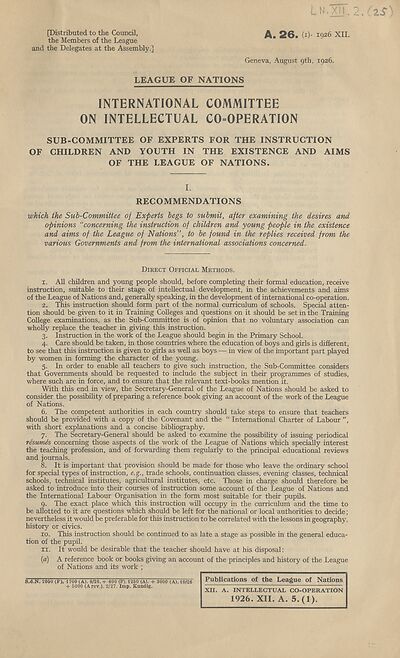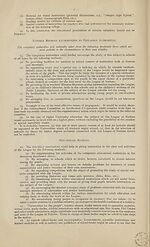Download files
Complete book:
Individual page:
Thumbnail gallery: Grid view | List view

[Distributed to the Council,
the Members of the League
and the Delegates at the Assembly.]
A. 26. (i)- 1926 xii.
Geneva, August 9th, 1926.
LEAGUE OF NATIONS
INTERNATIONAL COMMITTEE
ON INTELLECTUAL COOPERATION
SUB-COMMITTEE OF EXPERTS FOR THE INSTRUCTION
OF CHILDREN AND YOUTH IN THE EXISTENCE AND AIMS
OF THE LEAGUE OF NATIONS.
I.
RECOMMENDATIONS
which the Sub-Committee of Experts begs to submit, after examining the desires and
opinions ‘‘concerning the instruction of children and young people in the existence
and aims of the League of Nations’, to be found in the replies received from the
various Governments and from the international associations concerned.
Direct Official Methods.
1. All children and young people should, before completing their formal education, receive
instruction, suitable to their stage of intellectual development, in the achievements and aims
of the League of Nations and, generally speaking, in the development of international co-operation.
2. This instruction should form part of the normal curriculum of schools. Special atten¬
tion should be given to it in Training Colleges and questions on it should be set in the Training
College examinations, as the Sub-Committee is of opinion that no voluntary association can
wholly replace the teacher in giving this instruction.
3. Instruction in the work of the League should begin in the Primary School.
4. Care should be taken, in those countries where the education of boys and girls is different,
to see that this instruction is given to girls as well as boys — in view of the important part played
by women in forming the character of the young.
5. In order to enable all teachers to give such instruction, the Sub-Committee considers
that Governments should be requested to include the subject in their programmes of studies,
where such are in force, and to ensure that the relevant text-books mention it.
With this end in view, the Secretary-General of the League of Nations should be asked to
consider the possibility of preparing a reference book giving an account of the work of the League
of Nations.
6. The competent authorities in each country should take steps to ensure that teachers
should be provided with a copy of the Covenant and the “ International Charter of Labour ”,
with short explanations and a concise bibliography.
7. The Secretary-General should be asked to examine the possibility of issuing periodical
resumes concerning those aspects of the work of the League of Nations which specially interest
the teaching profession, and of forwarding them regularly to the principal educational reviews
and journals.
8. It is important that provision should be made for those who leave the ordinary school
for special types of instruction, e.g., trade schools, continuation classes, evening classes, technical
schools, technical institutes, agricultural institutes, etc. Those in charge should therefore be
asked to introduce into their courses of instruction some account of the League of Nations and
the International Labour Organisation in the form most suitable for their pupils.
9. The exact place which this instruction will occupy in the curriculum and the time to
be allotted to it are questions which should be left for the national or local authorities to decide ;
nevertheless it would be preferable for this instruction to be correlated with the lessons in geography,
history or civics.
xo. This instruction should be continued to as late a stage as possible in the general educa¬
tion of the pupil.
11. It would be desirable that the teacher should have at his disposal:
{a) A reference book or books giving an account of the principles and history of the League
of Nations and its work ;
S.d.N. 2050 (F). 1700 (A). 8/26. + 600 (F). 1250 (A). + 3000 (A). 10/26
+ 5000 (Arev.). 2/27. Imp. Kundig.
Publications of the League of Nations
XII. A. INTELLECTUAL CO-OPERATION
1926. XII. A. 5.(1).
the Members of the League
and the Delegates at the Assembly.]
A. 26. (i)- 1926 xii.
Geneva, August 9th, 1926.
LEAGUE OF NATIONS
INTERNATIONAL COMMITTEE
ON INTELLECTUAL COOPERATION
SUB-COMMITTEE OF EXPERTS FOR THE INSTRUCTION
OF CHILDREN AND YOUTH IN THE EXISTENCE AND AIMS
OF THE LEAGUE OF NATIONS.
I.
RECOMMENDATIONS
which the Sub-Committee of Experts begs to submit, after examining the desires and
opinions ‘‘concerning the instruction of children and young people in the existence
and aims of the League of Nations’, to be found in the replies received from the
various Governments and from the international associations concerned.
Direct Official Methods.
1. All children and young people should, before completing their formal education, receive
instruction, suitable to their stage of intellectual development, in the achievements and aims
of the League of Nations and, generally speaking, in the development of international co-operation.
2. This instruction should form part of the normal curriculum of schools. Special atten¬
tion should be given to it in Training Colleges and questions on it should be set in the Training
College examinations, as the Sub-Committee is of opinion that no voluntary association can
wholly replace the teacher in giving this instruction.
3. Instruction in the work of the League should begin in the Primary School.
4. Care should be taken, in those countries where the education of boys and girls is different,
to see that this instruction is given to girls as well as boys — in view of the important part played
by women in forming the character of the young.
5. In order to enable all teachers to give such instruction, the Sub-Committee considers
that Governments should be requested to include the subject in their programmes of studies,
where such are in force, and to ensure that the relevant text-books mention it.
With this end in view, the Secretary-General of the League of Nations should be asked to
consider the possibility of preparing a reference book giving an account of the work of the League
of Nations.
6. The competent authorities in each country should take steps to ensure that teachers
should be provided with a copy of the Covenant and the “ International Charter of Labour ”,
with short explanations and a concise bibliography.
7. The Secretary-General should be asked to examine the possibility of issuing periodical
resumes concerning those aspects of the work of the League of Nations which specially interest
the teaching profession, and of forwarding them regularly to the principal educational reviews
and journals.
8. It is important that provision should be made for those who leave the ordinary school
for special types of instruction, e.g., trade schools, continuation classes, evening classes, technical
schools, technical institutes, agricultural institutes, etc. Those in charge should therefore be
asked to introduce into their courses of instruction some account of the League of Nations and
the International Labour Organisation in the form most suitable for their pupils.
9. The exact place which this instruction will occupy in the curriculum and the time to
be allotted to it are questions which should be left for the national or local authorities to decide ;
nevertheless it would be preferable for this instruction to be correlated with the lessons in geography,
history or civics.
xo. This instruction should be continued to as late a stage as possible in the general educa¬
tion of the pupil.
11. It would be desirable that the teacher should have at his disposal:
{a) A reference book or books giving an account of the principles and history of the League
of Nations and its work ;
S.d.N. 2050 (F). 1700 (A). 8/26. + 600 (F). 1250 (A). + 3000 (A). 10/26
+ 5000 (Arev.). 2/27. Imp. Kundig.
Publications of the League of Nations
XII. A. INTELLECTUAL CO-OPERATION
1926. XII. A. 5.(1).
Set display mode to:
![]() Universal Viewer |
Universal Viewer | ![]() Mirador |
Large image | Transcription
Mirador |
Large image | Transcription
Images and transcriptions on this page, including medium image downloads, may be used under the Creative Commons Attribution 4.0 International Licence unless otherwise stated. ![]()
| League of Nations > International > International committee on intellectual co-operation > (1) |
|---|
| Permanent URL | https://digital.nls.uk/195163630 |
|---|
| Shelfmark | LN.XII |
|---|
| Description | Over 1,200 documents from the non-political organs of the League of Nations that dealt with health, disarmament, economic and financial matters for the duration of the League (1919-1945). Also online are statistical bulletins, essential facts, and an overview of the League by the first Secretary General, Sir Eric Drummond. These items are part of the Official Publications collection at the National Library of Scotland. |
|---|---|
| Additional NLS resources: |
|
